
Huissen is a city with city rights in the Netherlands, in the province of Gelderland. The town is located in the Betuwe region and belongs to the municipality of Lingewaard, in the area between the major cities of Arnhem and Nijmegen. Huissen is situated along the rivers Nederrijn and Linge. The city has a population of 19,414.

HetPrinsenhof is a museum in the city of Delft in the Netherlands. Formerly the monastery of St Agatha, the building changed purpose over time. The whole building came into the possession of Delft City Council by 1925, who gradually converted the building into a museum. Today, the museum shows a variety of art from Dutch Golden Age paintings, prints, cermaics and contemporary art.
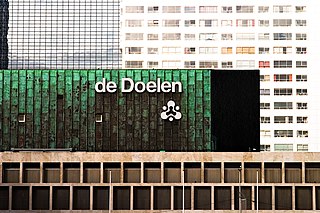
De Doelen is a concert venue and convention centre in Rotterdam, Netherlands. It was originally built in 1934 but then destroyed in 1940 during the German bombardment of Rotterdam in May 1940 at the outset of World War II. It was rebuilt in 1966, originally with one hall to which two more were added in the 1990s.

A rijksmonument is a national heritage site of the Netherlands, listed by the agency Rijksdienst voor het Cultureel Erfgoed (RCE) acting for the Dutch Ministry of Education, Culture and Science.

Nieuwezijds Kapel, or Heilige Stede or Chapel of the Heilige Stede refers to a site in Amsterdam that includes shops and a Dutch Reformed church built in 1908 on the site of a church once called the Heilige Stede, originally built in the 15th century to replace a chapel that burned in a city fire of 1452. That original chapel had been built in 1347 as a result of the miracle of Amsterdam, located on the Kalverstraat where this miracle with the eucharistic host occurred.

The Witte Huis or White House is a building and National Heritage Site in Rotterdam, Netherlands, built in 1898 in the Art Nouveau style. The building is 43 m (141 ft) tall, with 10 floors. It was the first hoogbouw in Europe. The building is listed as a Rijksmonument.

The former Van Nelle Factory on the Schie in Rotterdam, is considered a prime example of the modernist and functionalist architecture. It has been a designated UNESCO World Heritage Site since 2014. Soon after it was built, prominent architects described the factory as "the most beautiful spectacle of the modern age" and "a poem in steel and glass".

De Zoeker is the name of an oil windmill, located in the Zaanse Schans, Zaanstad. Its purpose is to press seeds such as linseed and rapeseed into vegetable oil. It is the only oil mill still in operation, and is one of five remaining oil mills in the area.

The Boezembrug is a bridge in Rotterdam, part of the Goudse Rijweg. The bridge connects both banks of the river Boezem. The bridge is a Rijksmonument designed by S. J. Rutgers in 1903.

The Rotterdam Cruise Terminal is a building on the Wilhelmina Pier, Rotterdam.

Kiefhoek is a neighborhood of Rotterdam, Netherlands.
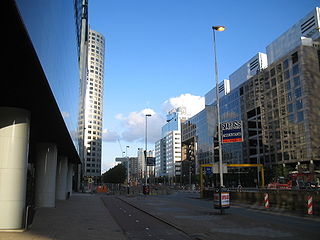
Weena is a street with many highrises in the center of Rotterdam, Netherlands. It defines the Rotterdam skyline. The street of about 1 kilometer length leads east-west from Hofplein to Beukelsdijk.
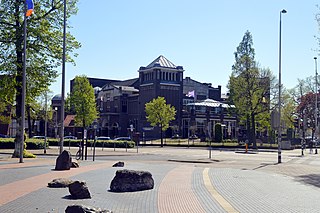
Concertgebouw de Vereeniging is a concert hall located in Nijmegen, Netherlands. The facility officially opened in 1915 and is built in a mixture of Art Nouveau and Art Deco styles. It has a capacity of 1,450 seats, and is renowned for its outstanding acoustics for orchestral music.
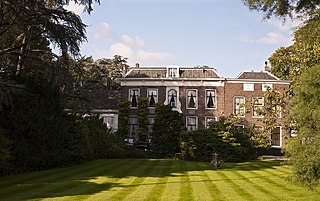
's-Gravenweg 168, Kralingen, Rotterdam is a Louis XIV-XV façade house ca. 1850 that is classified as a Dutch National Heritage Site.

Batenburg Castle is located in the village of Batenburg, in the Gelderland province in the Netherlands. It is thought that the castle began construction in 1300. The castle is located on the northern edge of the village. It is surrounded by a moat.

The Hofje van Mevrouw van Aerden is a museum and former hofje in Leerdam, Netherlands, on the Kerkstraat.

Eijsden Castle is a moated manor house with several farm buildings, a gatehouse and castle park, in Eijsden-Margraten, Limburg, Netherlands. The current castle was built in 1637 and is located next to the river Maas.
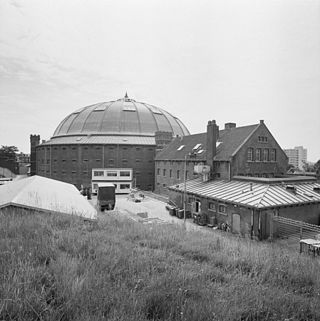
The Koepelgevangenis is a former prison in Arnhem, Netherlands. It is one of three Panopticon-style buildings situated in the country. Designed by Johan Metzelaar, the building was completed in 1886. A Rijksmonument, the prison closed in 2016. After the prison's closure, the building, along with the one at Haarlem, was used to house asylum seekers to the Netherlands.

The Destroyed City is a bronze memorial sculpture in the Dutch city of Rotterdam. It commemorates the German bombing of Rotterdam on 14 May 1940, which destroyed the medieval centre of the city. Unveiled in 1953, it was designated as a Dutch national monument (Rijksmonument) in 2010. It is the largest sculpture by the Russian-born French sculptor Ossip Zadkine, his best known work, and the best known sculpture in Rotterdam.
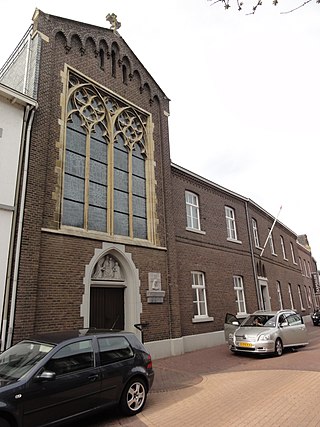
The Carmelite Monastery in Echt, in the province of Limburg, the Netherlands, also known as the Echt Carmel, is a community of Discalced Carmelite nuns established in 1879.





















